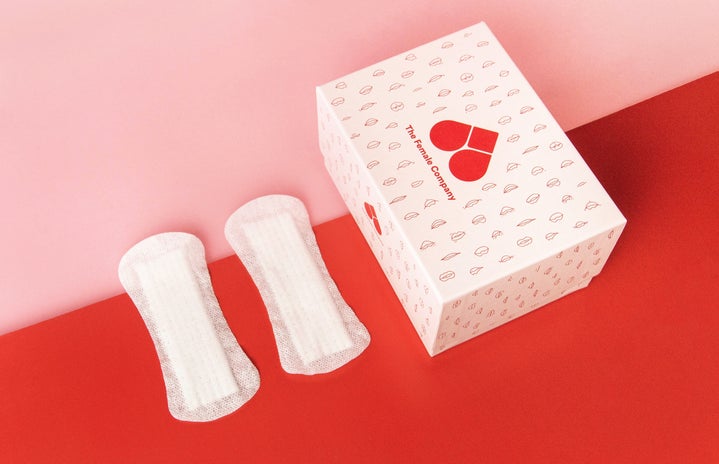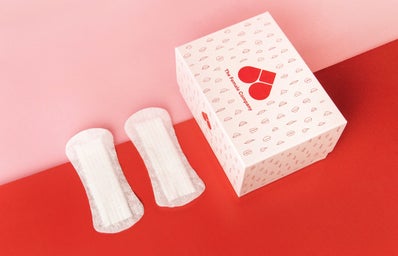Meet Shafuq Naseem: she came to George Mason in the fall of 2019 as a first year Government and International Politics major, but she didn’t wait for the opportunity to make her mark. Instead, she founded a chapter of PERIOD on campus before the semester had even begun, creating a space for members of the Mason community to raise their voices and work with chapters of the organization nationwide to have an impact on the menstrual movement.
Chloe Fischer (CF): What motivated you to start PERIOD @ GMU?
Shafuq Naseem (SN): I have always been passionate about advocating for social justice and those living in poverty for a long time now, and this summer I came across PERIOD.org, an organization that fights to end period poverty and period stigma through service, education and advocacy, and is the largest youth-led, women’s health-focused NGO (non-governmental organization) in the world.
As I learned more about period poverty, I automatically had this major privilege check. Many of us don’t think about what it’s like to be homeless as a menstruator, and what methods they have to resort to when on their period. I learned that some use cardboard, socks, and even trash. Reading that really struck a chord for me because financial insecurity has impacted my family first hand.
There is also this stigma around periods, and I knew that I wanted to start an effective conversation around a topic that makes some people uncomfortable, when it really shouldn’t.
I’m really passionate about gender equality and ending period poverty and period stigma will be a major step in reaching equality.
CF: What was the process of getting it off the ground administratively with GMU?
SN: Getting PERIOD @ GMU off the ground had its ups and downs. I wanted to make an impact in the lives of other students and members of our community, so I knew that introducing this organization to GMU would help do that.
As a freshman starting an organization the summer before school, I wasn’t sure where to start. I did my research, reached out to upperclassmen students, and was able to learn more about the process of applying to become an RSO. There was a substantial amount of paperwork and trainings that took some time due to my lack of knowledge, but eventually I was able to organize everything.
During this time, I was also an organizer for National Period Day, so even though we didn’t have our first meeting as soon as school started, we were able to build excitement around this rally. Now, PERIOD GMU is actually the most active chapter in Northern Virginia.
CF: What access is there to free or reduced price period care products for students in need at or around George Mason? What room do you feel there is to increase access?
SN: When it comes to “reduced price” period products, there are dispensers in most of the bathrooms on campus. However, there are issues when it comes to these dispensers. A lot of them are broken, have low-quality products, or only have tampons, which eliminates them as an option for menstruators that do not use tampons.
These products also typically cost around 25-50 cents, which is a problem because, frankly, we should have equitable access to period products and should not have to pay for them in the first place. Secondly, many students I have spoken to have expressed that it’s inconvenient since they typically do not carry change with them.
Overall, the dispenser system is very flawed and I’m working in student government and PERIOD @ GMU to change it. It’s not going to be an easy feat, but I’m ready to put my time and effort into getting menstrual products in all of the bathrooms on campus.
However, when it comes to free access, the Patriot Pantry provides menstrual products for students who are unable to afford them. I definitely want to work to educate students on resources that are available to them through the Patriot Pantry if they are experiencing financial insecurity. The Women and Gender Studies Department provides free pads and tampons as well, which I think is great.
Related: 5 Reasons You Need to Visit the Women and Gender Studies Center this Semester
CF: You were elected to the Student Senate earlier this semester, in what way does your work between the two organizations overlap?
SN: As I mentioned, one advocacy goal for PERIOD @ GMU is bringing free menstrual products in the bathrooms across campus, and with that in mind, I knew that having a voice in student government would be crucial. Three Senators (Senator Shelby Adams, Natalia Kanos, and Ayman Fatima) and myself are working on an initiative to bring free menstrual products in one of the buildings on campus, serving as a pilot program. Ultimately, we aim to bring free menstrual products in all the bathrooms on campus.
CF: In the 2019 election, Democrats now control both houses of the state legislature along with the executive branch, what do you think this means for women’s reproductive and period care access in the state?
SN: Having the Democrats now control both houses of the state legislature means a lot for women’s reproductive care access in the state. Now, the legislature has the power to make Virginia the 38th state to amend the Equal Rights Amendment in the 2020 session, and Virginia is the final state needed for ratification. The ERA will ensure equality in healthcare/reproductive healthcare.
As the Legislative Director for PERIOD DC, I’m leading the policy efforts in Virginia to end the tampon tax and pressuring legislators to enforce legislation that will bring equitable access to period products in places such as schools, prisons, and shelters.
This is all a part of phase two of the period movement, #FreeThePeriod. There are 33 states that still have the tampon tax, and we have groups in those remaining states working to eliminate the tax. So connecting the work that I’m currently doing, I hope that now with a Democratic house and senate, we are able to accomplish these goals.
CF: Always made the controversial decision to remove the Venus symbol from their packaging, how important do you think it is for mainstream brands and organizations to continue to include more than just cisgendered women in the conversation around period care?
SN: I always say that diversity and inclusion are two different things. Diversity is having intersectional representation present, but inclusion is making sure that representation is heard equally. This really applies to the decision Always made in removing the Venus symbol from their packaging because using inclusive language (i.e. removing the Venus symbol, or using the term “menstrual products instead of femenine hygiene products) is just the first step in achieving inclusivity on all levels.
We must remember that not all women menstruate, and not all menstruators are women. Going back to connecting with my role in student government, I’m working on getting the signs in the bathrooms that say not to flush “feminine hygiene products” changed so that we are using gender inclusive language.
It is so important that we leave no one behind in this fight for menstrual equity and gender equality.
CF: The National Period Day Rally in D.C. was a huge success, what was that experience like?
SN: The National Period Day rally in D.C. and the process of organizing is something I will never forget. I remember over the summer when we the National Period Day campaign was launched we had 4 RSVPs on our rally Facebook page, but that ultimately turned into a few hundred. I focused heavily on spreading the word to organizations across the DMV, speaking at events, and helping wherever I was needed. National Period Day was a major team effort, so this event would not have been able to happen if it weren’t for the incredible leadership in PERIOD DC–Nina Sarhan and Nora Di Martino.
Now as phase two begins, and as the Legislative Director on the PERIOD.org DC team, I am in the process of organizing lobby days with an organization called Platform, organizing more rallies and protests, forming petitions to end the tampon tax in Virginia, preparing hearing statements for when PERIOD DC will begin testifying at the state house, and working with the press to elevate the issue of period poverty at the national level.
CF: Where can you and PERIOD.GMU be found?
SN: I’m active on Instagram (@shafuqnaseem) and am always open to answer any questions, whether that may be about starting an RSO, being involved with PERIOD GMU, or if you want to talk about dismantling the patriarchy. You can also follow @period.gmu for updates on events and meetings. Since office hours for student senate change every semester, follow @setforsenate for updates!
Related: The Menstrual Movement is Important, Period.
Are you ready to join the menstrual movement yet, collegiettes?



